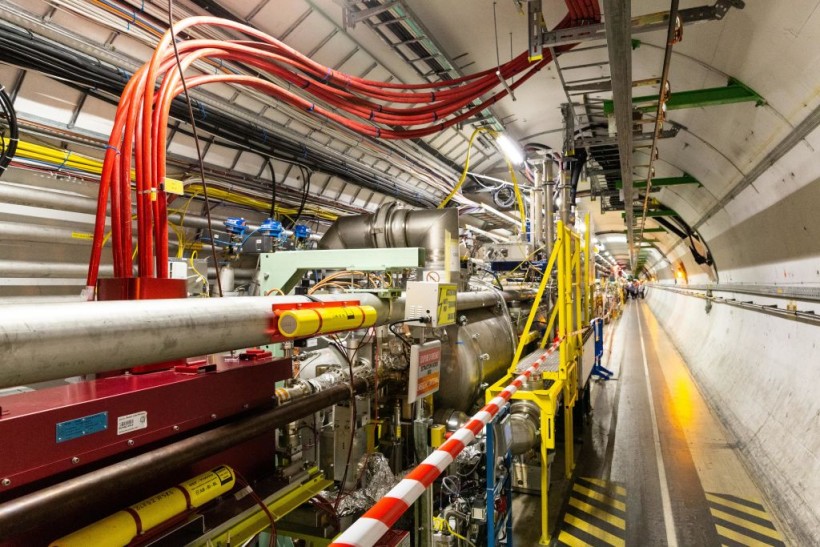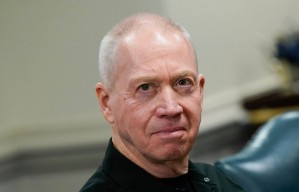
(Photo : Ronald Patrick/Getty Images)
Open Days At CERN Particle Physics Lab
MEYRIN, SWITZERLAND - SEPTEMBER 14: A part of complex Large Hadron Collider (LHC) is seen underground during the Open Days at the CERN particle physics research facility on September 14, 2019 in Meyrin, Switzerland.
Russian Federation's collaboration with NASA and CERN has been a casualty of international sanction due to the ongoing conflict in Ukraine, which is quite unfortunate. These agencies will prohibit any work or projects wherein Russia is involved, and it was on further notice.
Russia is not allowed at CERN or NASA, where it is a significant participant as Moscow is getting edged out slowly.
Observer Status at CERN Awarded to Russia
Russian scientists have been prevented from joining the new Large Hadron Collider experiments; the European Organization for Nuclear Research (CERN) said so, the Daily Mail reported.
CERN will further support initiatives for all Ukrainian scientists involved in the field of high-energy physics.
The organization operates the Large Hadron Collider, the world's biggest and most powerful particle accelerator, that made the headlines in 2012 when the Higgs Boson elementary particle was identified. The laboratory, with a huge magnet whose circumference is 16 miles, is located underground at Geneva, near the French-Swiss border.
The Council governing CERN met on Tuesday to discuss how to go about working in Moscow, then its decision, posted in an online statement, cited CERN.
All the 23 members of the group said they condemned the military invasion of Ukraine. They denounce the resulting deaths and humanitarian repercussions and Belarus' role in this illegal use of force towards Ukraine, pledging to support the humanitarian effort in Ukraine and Ukrainians at CERN.
Russian Federation was given a reprieve as an observer but could not actively participate until informed.
Read Also: Vladimir Putin Net Worth 2022: Does Anyone Know Russian President's Hidden Wealth?
Nation-states who are observers are not official members. It is a status given to countries that have given contributions and participated in significant contributions to CERN.
Observer accreditation has earlier been awarded to Japan, Russia, the United States, and three institutions: the European Union, the Joint Institute for Nuclear Research (JINR), and the United Nations Educational, Scientific, and Cultural Organization (UNESCO).
Ukraine NOt Member State at CERN
The ex-Soviet bloc country has an exception despite not being one of the 23 member states; instead, an Associate CERN member paying a reduced fee. The perks are benefits from the research of the giant collider.
This week, Russian scientists issued a letter on Google Docs who worked with the scientific organization and published it online.
The letter's contents read that they were sorry about what happened to Ukraine. They added they were against military action done against the country by Russia. "We are convinced that the only way to resolve the conflict is through negotiation and dialogue."
Russian Invasion Impact on the Scientific Community
The invasion of Ukraine has affected the status of Russia in the European Space Agency (ESA) that its 23 members decided.
Scientific casualties include the UK-built Rosalind Franklin rover that will be delayed in 2022. The project is Russia's space agency Roscosmos working on the ExoMars mission.
Dmitry Rogozin, director-general of Russian space agency Roscosmos, reacted to the issue on Twitter, commenting in his native language: 'The European Space Agency, to annoy the Russian grandmother, chose to freeze off her ears.'
He asked what would happen to the International Space Station (ISS) without the Russian space agency and what would occur when the ISS crashes.
Russian Federation collaboration on important projects like CERN and ISS is a great concern with Moscow as one brain trusts guides them.
Related Article: Fusion Reactor Technology Tokamak In the Next Race That Advanced Nations To Produce Cleaner, Sustainable Energy is Heating Up








